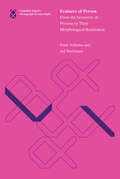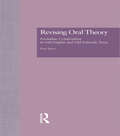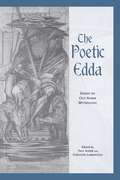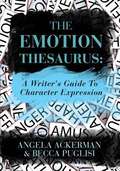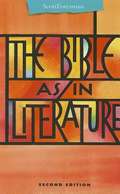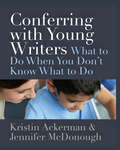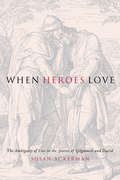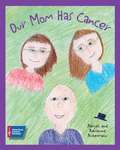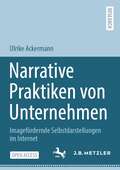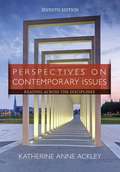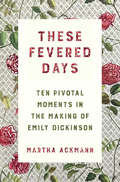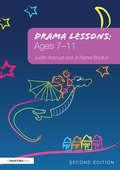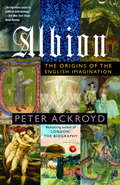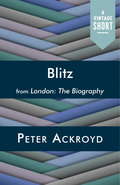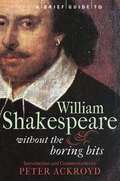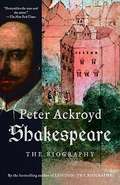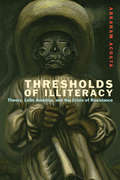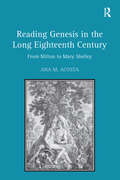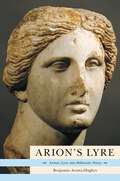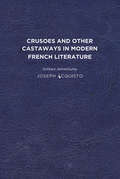- Table View
- List View
Features of Person: From the Inventory of Persons to Their Morphological Realization (Linguistic Inquiry Monographs #78)
by Peter Ackema Ad NeelemanA proposal that person features do not have inherent content but are used to navigate a “person space” at the heart of every pronominal expression.This book offers a significant reconceptualization of the person system in natural language. The authors, leading scholars in syntax and its interfaces, propose that person features do not have inherent content but are used to navigate a “person space” at the heart of every pronominal expression. They map the journey of person features in grammar, from semantics through syntax to the system of morphological realization. Such an in-depth cross-modular study allows the development of a theory in which assumptions made about the behavior of a given feature in one module bear on possible assumptions about its behavior in other modules. The authors' new theory of person, built on a sparse set of two privative person features, delivers a typologically adequate inventory of persons; captures the semantics of personal pronouns, impersonal pronouns, and R-expressions; accounts for aspects of their syntactic behavior; and explains patterns of person-related syncretism in the realization of pronouns and inflectional endings. The authors discuss numerous observations from the literature, defend a number of theoretical choices that are either new or not generally accepted, and present novel empirical findings regarding phenomena as different as honorifics, number marking, and unagreement.
First Readers of Shakespeare’s Sonnets, 1590-1790 (Routledge Studies in Shakespeare)
by Faith D. AckerFor more than four centuries, cultural preferences, literary values, critical contexts, and personal tastes have governed readers’ responses to Shakespeare’s sonnets. Early private readers often considered these poems in light of the religious, political, and humanist values by which they lived. Other seventeenth- and eighteenth- century readers, such as stationers and editors, balanced their personal literary preferences against the imagined or actual interests of the literate public to whom they marketed carefully curated editions of the sonnets, often successfully. Whether public or private, however, many disparate sonnet interpretations from the sonnets’ first two centuries in print have been overlooked by modern sonnet scholarship, with its emphasis on narrative and amorous readings of the 1609 sequence. First Readers of Shakespeare’s Sonnets reintroduces many early readings of Shakespeare’s sonnets, arguing that studying the priorities and interpretations of these previous readers expands the modern critical applications of these poems, thereby affording them numerous future applications. This volume draws upon book history, manuscript studies, and editorial theory to recover four lost critical approaches to the sonnets, highlighting early readers’ interests in Shakespeare’s classical adaptations, political applicability, religious themes, and rhetorical skill during the seventeenth and eighteenth centuries.
Revising Oral Theory: Formulaic Composition in Old English and Old Icelandic Verse (Garland Studies in Medieval Literature #Vol. 16)
by Paul AckerFirst published in 1998. Routledge is an imprint of Taylor & Francis, an informa company.
The Poetic Edda: Essays on Old Norse Mythology (Garland Medieval Casebooks #30)
by Paul Acker Carolyne LarnngtonFirst published in 2002. Routledge is an imprint of Taylor & Francis, an informa company.
Reading Modern Drama
by Alan AckermanExploring the relationship between dramatic language and its theatrical aspects, Reading Modern Drama provides an accessible entry point for general readers and academics into the world of contemporary theatre scholarship. This collection promotes the use of diverse perspectives and critical methods to explore the common theme of language as well as the continued relevance of modern drama in our lives.Reading Modern Drama offers provocative close readings of both canonical and lesser-known plays, from Hedda Gabler to e.e. cummings' Him. Taken together, these essays enter into an ongoing, fruitful debate about the terms 'modern' and 'drama' and build a much-needed bridge between literary studies and performance studies.
Seeing Things
by Alan AckermanA technological revolution has changed the way we see things. The storytelling media employed by Pixar Animation Studios, Samuel Beckett, and William Shakespeare differ greatly, yet these creators share a collective fascination with the nebulous boundary between material objects and our imaginative selves. How do the acts of seeing and believing remain linked? Alan Ackerman charts the dynamic history of interactions between showing and knowing in Seeing Things, a richly interdisciplinary study which illuminates changing modes of perception and modern representational media.Seeing Things demonstrates that the airy nothings of A Midsummer Night's Dream, the Ghost in Hamlet, and soulless bodies in Beckett's media experiments, alongside Toy Story's digitally animated toys, all serve to illustrate the modern problem of visualizing, as Hamlet put it, 'that within which passes show.' Ackerman carefully analyses such ghostly appearances and disappearances across cultural forms and contexts from the early modern period to the present, investigating the tension between our distrust of shadows and our abiding desire to believe in invisible realities. Seeing Things provides a fresh and surprising cultural history through theatrical, verbal, pictorial, and cinematic representations.
The Emotion Thesaurus: A Writer's Guide To Character Expression
by Angela Ackerman Becca PuglisiOne of the biggest problem areas for writers is conveying a character's emotions to the reader in a unique, compelling way. This book highlights 75 emotions and lists the possible body language cues, thoughts, and visceral responses for each. Readers can draw inspiration from character cues that range in intensity to match any emotional moment. The Emotion Thesaurus also tackles common emotion-related writing problems and provides methods to overcome them. This writing tool encourages writers to show, not tell emotion and is a creative brainstorming resource for any fiction project.
The Bible as/in Literature: Anthology
by James S. Ackerman Thayer S. Warshaw John SweetLiterature anthology
Conferring with Young Writers: What to Do When You Don't Know What to Do
by Kristin Ackerman Jennifer McDonoughIf you've ever sat down to confer with a child and felt at a loss for what to say or how to help move him or her forward as a writer, this book is for you. If you are a strong teacher of writing but are not seeing results from your students, this book is for you. Authors Kristin Ackerman and Jennifer McDonough have been teaching writing for several years and know that conferring can be a murky and messy process-;perhaps the hardest component of all. Written from the lessons they've learned through hard-won classroom experience-;their mistakes and challenges-;Conferring with Young Writers is based on what Kristin and Jen call the three Fs-: frequency, focus, and follow-up. They've created a classroom management system that offers routine and structure for giving the most effective feedback in a writing conference. This book will help writing teachers-;and students-;learn to break down and utilize the qualities that enable good writing: elaboration, voice, structure, conventions, and focus. The authors also provide the knowledge and skills it takes to confer well, which will help you improve as a writing teacher and give your students the confidence to think of themselves as writers.
When Heroes Love: The Ambiguity of Eros in the Stories of Gilgamesh and David (Gender, Theory, and Religion)
by Susan AckermanToward the end of the Mesopotamian Epic of Gilgamesh King Gilgamesh laments the untimely death of his comrade Enkidu, "my friend whom I loved dearly." Similarly in the Bible, David mourns his companion, Jonathan, whose "love to me was wonderful, greater than the love of women." These passages, along with other ambiguous erotic and sexual language found in the Gilgamesh epic and the biblical David story, have become the object of numerous and competing scholarly inquiries into the sexual nature of the heroes' relationships. Susan Ackerman's innovative work carefully examines the stories' sexual and homoerotic language and suggests that its ambiguity provides new ways of understanding ideas of gender and sexuality in the ancient Near East and its literature. In exploring the stories of Gilgamesh and Enkidu and David and Jonathan, Ackerman cautions against applying modern conceptions of homosexuality to these relationships. Drawing on historical and literary criticism, Ackerman's close readings analyze the stories of David and Gilgamesh in light of contemporary definitions of sexual relationships and gender roles. She argues that these male relationships cannot be taken as same-sex partnerships in the modern sense, but reflect the ancient understanding of gender roles, whether in same- or opposite-sex relationships, as defined as either active (male) or passive (female). Her interpretation also considers the heroes' erotic and sexual interactions with members of the opposite sex.Ackerman shows that the texts' language and erotic imagery suggest more than just an intense male bonding. She argues that, though ambiguous, the erotic imagery and language have a critical function in the texts and serve the political, religious, and aesthetic aims of the narrators. More precisely, the erotic language in the story of David seeks to feminize Jonathan and thus invalidate his claim to Israel's throne in favor of David. In the case of Gilgamesh and Enkidu, whose egalitarian relationship is paradoxically described using the hierarchically dependent language of sexual relationships, the ambiguous erotic language reinforces their status as liminal figures and heroes in the epic tradition.
Our Mom Has Cancer
by Abigail Ackermann Adrienne AckermannWhen Mom's hair started to fall out, the girls helped her shave it off and an aunt had a hat party.These were the kind of moments which helped them make it through the year of Mom's treatment--surgery, chemotherapy and radiation.
Narrative Praktiken von Unternehmen: Imagefördernde Selbstdarstellungen im Internet
by Ulrike AckermannDiese Open-Access-Publikation befasst sich mit dem Erzählen im Unternehmenskontext, was spätestens seit der Einführung des Storytelling in den 1999er-Jahren allgegenwärtig ist. Der Band zeigt in diesem Zusammenhang, wie Unternehmen das Erzählen explizit im Internet nutzen, um sich nach außen positiv darzustellen (= Imageförderung). In der Veröffentlichung wird deutlich, dass für die (Selbst)Darstellung bestimme Spezifika von Erzählungen von besonderer Bedeutung sind. Mit ihrer Hilfe können Unternehmen bspw. Konzepte – wie Corporate Responsibility – als gelebte Werte den Zielgruppen diskret veranschaulichen oder den Arbeitsalltag zu einem besonderen Erlebnis stilisieren. Insgesamt identifiziert die Autorin vier Grundtypen der (Selbst)Darstellung mit jeweils spezifisch narrativer Rhetorik sowie bezeichnende narrative Realisierungsformen, um diese Typen im WWW an die gewünschten Zielgruppen zu kommunizieren. Hierbei zeichnen sich die sprachwissenschaftlich analysierten Erkenntnisse durch ihre interdisziplinäre Einbettung aus. Dadurch eröffnen sich Anschlussmöglichkeiten zu anderen Fachdisziplinen.
Perspectives on Contemporary Issues: Reading Across Disciplines (Seventh Edition)
by Katherine Anne AckleyPERSPECTIVES on CONTEMPORARY ISSUES, 7th Edition, approaches learning as the interconnectedness of ideas and disciplinary perspectives. This cross-disciplinary reader encourages critical thinking and academic writing by presenting a variety of perspectives on current issues across the curriculum.
These Fevered Days: Ten Pivotal Moments In The Making Of Emily Dickinson
by Martha AckmannAn engaging, intimate portrait of Emily Dickinson, one of America’s greatest and most-mythologized poets, that sheds new light on her groundbreaking poetry. On August 3, 1845, young Emily Dickinson declared, “All things are ready” and with this resolute statement, her life as a poet began. Despite spending her days almost entirely “at home” (the occupation listed on her death certificate), Dickinson’s interior world was extraordinary. She loved passionately, was hesitant about publication, embraced seclusion, and created 1,789 poems that she tucked into a dresser drawer. In These Fevered Days, Martha Ackmann unravels the mysteries of Dickinson’s life through ten decisive episodes that distill her evolution as a poet. Ackmann follows Dickinson through her religious crisis while a student at Mount Holyoke, which prefigured her lifelong ambivalence toward organized religion and her deep, private spirituality. We see the poet through her exhilarating frenzy of composition, through which we come to understand her fiercely self-critical eye and her relationship with sister-in-law and first reader, Susan Dickinson. Contrary to her reputation as a recluse, Dickinson makes the startling decision to ask a famous editor for advice, writes anguished letters to an unidentified “Master,” and keeps up a lifelong friendship with writer Helen Hunt Jackson. At the peak of her literary productivity, she is seized with despair in confronting possible blindness. Utilizing thousands of archival letters and poems as well as never-before-seen photos, These Fevered Days constructs a remarkable map of Emily Dickinson’s inner life. Together, these ten days provide new insights into her wildly original poetry and render a concise and vivid portrait of American literature’s most enigmatic figure.
Drama Lessons: Ages 7-11
by Judith Ackroyd Jo Barter-BoultonDrama Lessons: Ages 7–11 offers an exciting and varied range of tried and tested lessons tailor-made for busy teachers. Drama Lessons: Ages 7–11 emerges from the continuing positive responses to Drama Lessons for Five to Eleven Year Olds (2001). In this book you will find a carefully chosen selection of the best lessons from the original book, plus some exciting new material – a combination of brand new and classic lessons. This new collection introduces Literacy Alerts which identify how the drama activities develop aspects of literacy and suggest additional literacy activities. For each lesson plan, essential resources and timing information are provided. The lessons cover a range of themes and curriculum areas. Full of pick-up-and-go lesson plans, this book will be of enormous interest to specialists and non-specialists of drama alike. All primary teachers, literacy coordinators and teaching assistants should have this book in their hands and it will give all trainee teachers a flying start in their school placements.
Albion: Origins of the English Imagination
by Peter AckroydAn exciting new book from the acclaimed author of the magnificent London: The Biography. This book covers the whole of English cultural history from the Anglo-Saxon period to the present day -- from the Venerable Bede through English myths such as the legends about King Arthur and Albion to C. S. Lewis; from Chaucer through Spencer to George Eliot; from the English mystics through the philosopher Locke to Iris Murdoch; from Purcell through Elgar to Michael Tippett; from Hogarth through Constable to Turner; from mystery plays through Shakespeare to music hall. Peter Ackroyd's favourite themes are here: the visionary poetry of Blake, the theatrical novels of Dickens, the humanism of Thomas More -- and there are also explorations of forgery and plagiarism, Romanticism, artificiality, farce and pantomime, assimilation and energy. The author leads the reader through a labyrinth in one of the most exuberant books to be published this year.
Blitz
by Peter AckroydA Vintage Shorts Travel Selection Peter Ackroyd's staggering and prodigious capstone accomplishment, London: A Biography, details the history and--perhaps most ardently--the tenor of his hometown with indelible care. From the Iron Age to present day, Ackroyd's narrative sweeps through the centuries with an effortless immediacy, bringing the city to life. In this selection, the bestselling and award-winning author delivers a resonant account of the raids on London during the Second World War. Bombs and fires flare, naturally, but it is Ackroyd's esteem of Londoners themselves that endows this story with energy: "It was the invisible and intangible spirit or presence of London that survived, and somehow flourished, in [this] period of devastation." A rich, immersive plunge into some of London's darkest days. An eBook Short.
A Brief Guide to William Shakespeare (Brief Histories)
by Peter AckroydAn accessible and entertaining journey through the life, times, and work of the Bard - Enigma. Master of language. The greatest comedian in history? The most famous writer in the world. But isn't he a little bit boring? This is an essential guide for anyone who has previously avoided the Bard, and is the perfect introduction for first time students or seasoned theatre lovers. The book contains a full commentary of all the plays by bestselling and reknowned writer Peter Ackroyd as well as full descriptions of the cast and the drama; not forgetting the best speeches, and the wit and wisdom from across the works. There is also an opportunity to explore the poems and a complete set of sonnets, as well as an investigation of who the dark lady might have been.Contains:The complete sonnets; the greatest speeches; the best lines.Perfect for students struggling through their first play or for theatre lovers anywhere.Entertaining, accessible, Shakespeare without the boring bits.
The Last Testament of Oscar Wilde
by Peter AckroydProvides insightful commentary on Wilde and his work.
Shakespeare: The Biography
by Peter AckroydThis is the big one from Peter Ackroyd — and a worthy companion toLondon: The Biography. Only Peter Ackroyd can combine readable narrative and unique observation with a sharp eye for the fascinating fact. His method is to position Shakespeare in the close context of his world. In this way, he not only richly conjures up the texture of Shakespeare’s life, but also imparts an amazing amount of vivid, interesting material about place, period and background. Some snippets: Shakespeare was secretly a Roman Catholic; the witches in Macbeth were not hags but nymphs played by boys; the “best” bed was for guests which was why he bequeathed his wife his “second best” bed (the matrimonial bed in which he probably died); “ham acting” derives from the strutting walk which showed off the ham-strings; an actor called “Will” played female parts — could it have been Shakespeare himself? And, the strongest bond in the plays is between father and daughter, perhaps reflecting Shakespeare’s own family life. From the Hardcover edition.
Thresholds of Illiteracy: Theory, Latin America, and the Crisis of Resistance
by Abraham AcostaThresholds of Illiteracy reevaluates Latin American theories and narratives of cultural resistance by advancing the concept of “illiteracy” as a new critical approach to understanding scenes or moments of social antagonism. “Illiteracy,” Acosta claims, can offer us a way of talking about what cannot be subsumed within prevailing modes of reading, such as the opposition between writing and orality, that have frequently been deployed to distinguish between modern and archaic peoples and societies. This book is organized as a series of literary and cultural analyses of internationally recognized postcolonial narratives. It tackles a series of the most important political/aesthetic issues in Latin America that have arisen over the past thirty years or so, including indigenism, testimonio, the Zapatista movement in Chiapas, and migration to the United States via the U.S.–Mexican border. Through a critical examination of the “illiterate” effects and contradictions at work in these resistant narratives, the book goes beyond current theories of culture and politics to reveal radically unpredictable forms of antagonism that advance the possibility for an ever more democratic model of cultural analysis.
Reading Genesis in the Long Eighteenth Century: From Milton to Mary Shelley
by Ana M. AcostaIn a reassessment of the long-accepted division between religion and enlightenment, Ana Acosta here traces a tissue of readings and adaptations of Genesis and Scriptural language from Milton through Rousseau to Wollstonecraft and Mary Shelley. Acosta's interdisciplinary approach places these writers in the broader context of eighteenth-century political theory, biblical criticism, religious studies and utopianism. Acosta's argument is twofold: she establishes the importance of Genesis within utopian thinking, in particular the influential models of Milton and Rousseau; and she demonstrates that the power of these models can be explained neither by traditional religious paradigms nor by those of religion or philosophy. In establishing the relationship between biblical criticism and republican utopias, Acosta makes a solid case that important utopian visions are better understood against the background of Genesis interpretation. This study opens a new perspective on theories of secularization, and as such will interest scholars of religious studies, intellectual history, and philosophy as well as of literary studies.
Arion's Lyre: Archaic Lyric into Hellenistic Poetry
by Benjamin Acosta-HughesArion's Lyre examines how Hellenistic poetic culture adapted, reinterpreted, and transformed Archaic Greek lyric through a complex process of textual, cultural, and creative reception. Looking at the ways in which the poetry of Sappho, Alcaeus, Ibycus, Anacreon, and Simonides was preserved, edited, and read by Hellenistic scholars and poets, the book shows that Archaic poets often look very different in the new social, cultural, and political setting of Hellenistic Alexandria. For example, the Alexandrian Sappho evolves from the singer of Archaic Lesbos but has distinct associations and contexts, from Ptolemaic politics and Macedonian queens to the new phenomenon of the poetry book and an Alexandrian scholarship intent on preservation and codification. A study of Hellenistic poetic culture and an interpretation of some of the Archaic poets it so lovingly preserved, Arion's Lyre is also an examination of how one poetic culture reads another--and how modern readings of ancient poetry are filtered and shaped by earlier readings.
Crusoes and Other Castaways in Modern French Literature: Solitary Adventures
by Joseph AcquistoCrusoes and Other Castaways in Modern French Literature: Solitary Adventures by Joseph Acquisto examines the many ways in which the castaway, particularly in the form of engagement with Robinson Crusoe, has been reinterpreted and appropriated in nineteenth through twenty-first century French literature. The book is not merely a literary history of the robinsonnade in France; rather, Acquisto demonstrates how what he calls the genre of “solitary adventure” becomes a vehicle for exploration of much larger questions about the reception of texts, modes of reading, and the relationship between popular and serious literary traditions. The heart of Crusoes and Other Castaways in Modern French Literature examines a crucial moment in the late nineteenth and early twentieth centuries when the history of cultural perspectives on reading and solitude intersect, catalyzing a reconsideration of Defoe’s tale. Acquisto’s philosophically inflected readings of works by writers from Rousseau to Balzac, Verne to Gide, Valéry to Tournier enhance intertextual and cultural approaches to the castaway myth and broaden our appreciation of the dynamic relation it has to modern French literature writ large. Published by University of Delaware Press. Distributed worldwide by Rutgers University Press.
